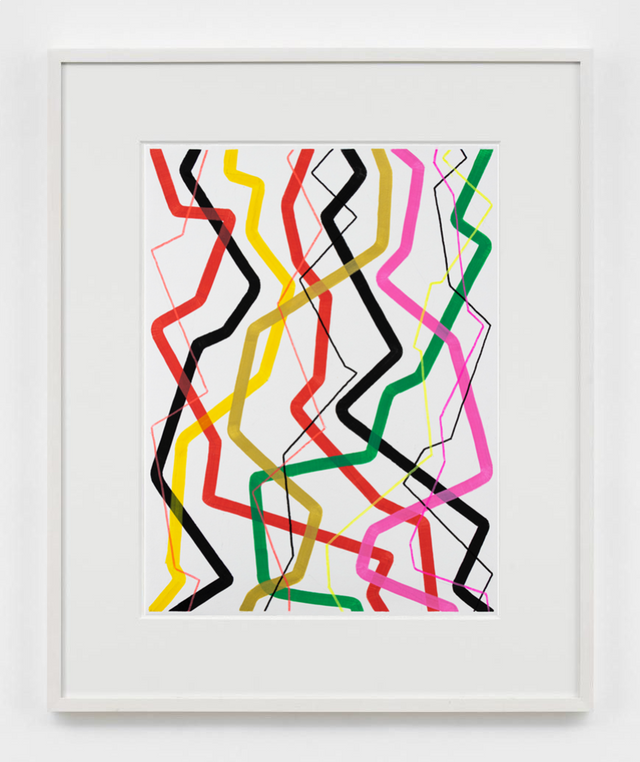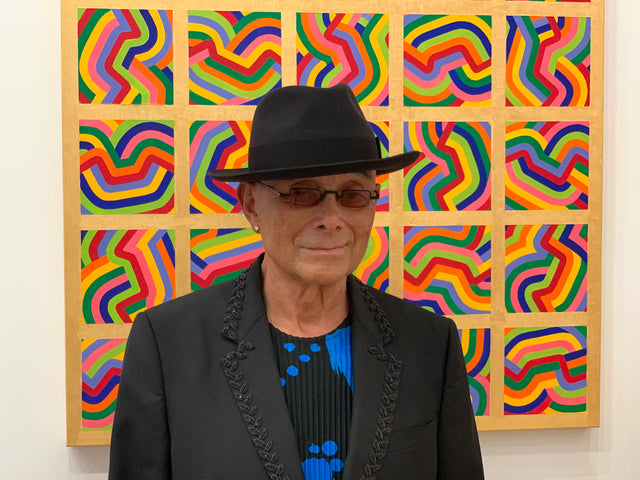
Osvaldo Mariscotti: Flash, 2023
Osvaldo Mariscotti’s prolific career as printmaker, painter and sculptor has spanned over four decades, and his iconic images are internationally renowned. One of the most significant artists working today, Mariscotti's dedication to the interaction of form and color has led to a continued exploration of perception. He takes over the most basic elements of Suprematist art, the straight line and the square, a choice that reflects the emphasis he places on the shapes produced by man rather than those existing in nature. His works are very significant, made from the decomposition of figures such as the rectangle, which is then decomposed into its essential colored lines on a black background. Mariscotti's search puts him in the context of geometric conceptualism: that reality of thought that holds figuration as malaise and searches for synthesis, as a model to pursue. His art examines the "non reality" and breaks it down into geometric shapes, to arrive at the development of a new code.
Works by Osvaldo Mariscotti are found in major private and public collections, including the Galleria Nazionale d'Arte Moderna, Rome; the Department of State, Washington, D.C.; the UBS Art Collection; the Washington County Museum of Fine Arts, Hagerstown, MD; and the Asheville Art Museum.
In 2015, Mariscotti first participated in the 56th Venice Biennale with his now iconic Book of Color I. Mariscotti’s artwork has been featured in numerous solo and group exhibitions in prestigious institutions around the world such as the MIIT Museum, Turin; the Malzfabrik, Berlin; the Chianciano Museum of Art, Chianciano Terme; the Galata Museum, Genoa; the Officina delle Zattere, Venice; the European Museum of Modern Art (MEAM), Barcelona; Canova Museum, Possagno; and the Museum of Contemporary Art Giuseppe Sciortino, Monreale.
- Title: Flash
- Year: 2023
- Medium: Screenprint in colors, on Rives BFK paper
- Sheet size: 34 x 24 in. (86.4 x 61 cm)
- Edition size: 100
- Markings: Signed, dated, and numbered in pencil, lower margin
- Condition: Mint, unframed
- Publisher: Upsilon Gallery, New York
Shipping charges and taxes will be calculated at checkout and included on your Order Confirmation.
Please see Shipping & Returns for more information.
About the Artist
Learn More
Osvaldo Mariscotti
Osvaldo Mariscotti’s prolific career as printmaker, painter and sculptor has spanned over four decades, and his iconic images are internationally renowned. One of the most significant artists working today, Mariscotti's dedication to the interaction of form and color has led to a continued exploration of perception. He takes over the most basic elements of Suprematist art, the straight line and the square, a choice that reflects the emphasis he places on the shapes produced by man rather than those existing in nature. His works are very significant, made from the decomposition of figures such as the rectangle, which is then decomposed into its essential colored lines on a black background. Mariscotti's search puts him in the context of geometric conceptualism: that reality of thought that holds figuration as malaise and searches for synthesis, as a model to pursue. His art examines the "non reality" and breaks it down into geometric shapes, to arrive at the development of a new code.
Works by Osvaldo Mariscotti are found in major private and public collections, including the Galleria Nazionale d'Arte Moderna, Rome; the Department of State, Washington, D.C.; the UBS Art Collection; the Washington County Museum of Fine Arts, Hagerstown, MD; and the Asheville Art Museum.
In 2015, Mariscotti first participated in the 56th Venice Biennale with his now iconic Book of Color I. Mariscotti’s artwork has been featured in numerous solo and group exhibitions in prestigious institutions around the world such as the MIIT Museum, Turin; the Malzfabrik, Berlin; the Chianciano Museum of Art, Chianciano Terme; the Galata Museum, Genoa; the Officina delle Zattere, Venice; the European Museum of Modern Art (MEAM), Barcelona; Canova Museum, Possagno; and the Museum of Contemporary Art Giuseppe Sciortino, Monreale.
Be the first to know about new collections and exclusive offers.
Subscribe to our newsletter

